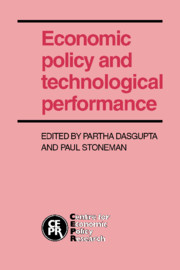Book contents
- Frontmatter
- Contents
- List of tables
- List of figures
- Preface
- List of participants
- Introduction
- 1 The economic theory of technology policy: an introduction
- 2 Current policy practice and problems from a UK perspective
- 3 The importance of technology policy
- 4 The value of patents as indicators of inventive activity
- 5 Learning to learn, localized learning and technological progress
- 6 Some analytical observations on diffusion policies
- 7 International trade and technology policy
- 8 Some new standards for the economics of standardization in the information age
- Index
5 - Learning to learn, localized learning and technological progress
Published online by Cambridge University Press: 17 September 2009
- Frontmatter
- Contents
- List of tables
- List of figures
- Preface
- List of participants
- Introduction
- 1 The economic theory of technology policy: an introduction
- 2 Current policy practice and problems from a UK perspective
- 3 The importance of technology policy
- 4 The value of patents as indicators of inventive activity
- 5 Learning to learn, localized learning and technological progress
- 6 Some analytical observations on diffusion policies
- 7 International trade and technology policy
- 8 Some new standards for the economics of standardization in the information age
- Index
Summary
There is a well known saying that ‘Consistency is the Hobgoblin of small minds’. If this be true, then economics has been well endowed with minds that are not small.
Among Adam Smith's many contributions to economics, two that perhaps stand out are his ‘invisible hand’ conjecture and his discussion of the role of specialization. Modern day economists applaud him for both of these insights; but when they have come to formalize the former conjecture, in the shape of the Fundamental Theorem of Welfare Economics, they have made assumptions concerning convexity which essentially preclude the existence of specialization, or are in any case inconsistent with the arguments put forward by Adam Smith for the advantages of specialization within his famous pin factory.
This chapter takes seriously the notion of economic specialization. The advances in living standards over the past two centuries have been accompanied by – perhaps caused by – increasing specialization, and it is essential to understand the nature of specialization if we are to understand the development of modern economies. One must understand both what are the returns to, and the limits of, specialization.
There appear to be two basic sources of economies of specialization. (a) Many of the costs associated with the performance of a task are fixed costs – in particular, the costs associated with learning how to perform the task well.
- Type
- Chapter
- Information
- Economic Policy and Technological Performance , pp. 125 - 153Publisher: Cambridge University PressPrint publication year: 1987
- 94
- Cited by



